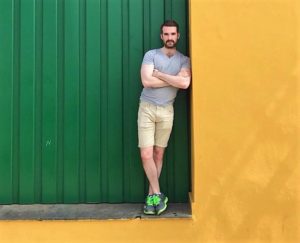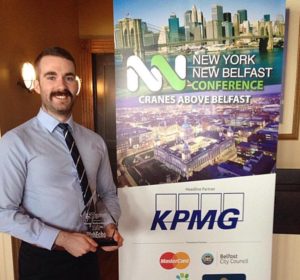Introducing our new Northern Roots series, where we speak to people who are originally from Northern Ireland but are currently living elsewhere, about home and their hopes for the future. Our first interviewee is James Cumiskey. You can follow James on Twitter @JamesCumiskey1.
1. Tell us about yourself. When did you leave Northern Ireland, and where did you go? What do you do now?
For the last 7 years or so I’ve been in and out of Ireland quite frequently both travelling and in some cases working in different countries. Back in 2015, I did some research and decided that I was going to head to New York and network on the ground, in an attempt to find work in my field.
The process and road was not an easy one. Getting and attending interviews was manageable, explaining that I had to apply for a work visa after that, was found….amusing. Although lengthy and challenging, I thankfully was offered a position in the Tech sector as a Business Development Manager. Something I owe both to my experience in the industry and the Irish network of people who came before me and pointed me in the right directions.
2. What do you think when you see the Northern Ireland of today, in the news and on social media?
I think for someone of my age group it can be quite frustrating. Compared with other European states we can see Northern Ireland as this backward place that gets a lot of bad coverage, known for its political hiccups and in a lot of cases, rightly so.
The recent media attention around the DUP and the North is something a lot of people were quite embarrassed by. Personally, it was something I welcomed. I think the social and political difficulties facing Northern Ireland because of the DUP’s political and social views is something that needs to be highlighted more in Britain.
DUP aside, we’ve got to remember, that we are still in the middle of an evolving peace process, which not everyone my age can relate to, as we didn’t live through the worst of it. If you really look at the North in the ’70s/’80s and the attitudes that existed then compared with now, you can honestly see how far it’s come. It’s remarkable.
We agreed on a peace deal that seemed like it could never be done, and for all its flaws and ups and downs, it has primarily stuck. How amazing is that? What an example to the world that is.
There is still a lot of work to do, but that’s the point. These things won’t fix itself overnight. It takes years, even decades before change can really be felt.

3. Are you hopeful for Northern Ireland’s future? Will Brexit make a difference?
In terms of the North’s economic future, no. I think Brexit is a disaster for the North across all aspects of society.
With our withdrawal of the EU forced upon us, I can’t see any international investment being attracted to NI, not to mention the loss of EU peace and regeneration money and farmers bursaries we’ve enjoyed for the last 20 years. This is something I doubt Britain will be subsidizing in an already failing economy.
The implication of some sort of trade/immigration border with the South will be a disruption to thousands of people’s daily lives, along with being hugely symbolic, threatening the peace we’ve worked so hard to achieve.
I do think Brexit will act, though, as a reality check across all communities; how a decision made by Britain can impact us so negatively and will start the already ongoing discussion ‘Does Britain really have Northern Ireland’s best interests at heart?!’
4. Do you think you will return to Northern Ireland? What could convince you to come back?
Well, my family are all based there. So, yes, ideally I will return in the coming years to be closer with them. Ireland will always be home but I would like to see greater social and economic progression in the North, in order to be more positive about its future.
5. What can Northern Ireland learn from the place you live now?
New York, and America for that matter is by no means perfect and there are qualities of Ireland and growing up in County Armagh that I cherish. However, the diversity of people in New York just works. Attitudes are very liberal and people can live alongside each other and embrace different cultures with ease. It’s something I admire and aspire the North to do, providing it is done respectfully.
6. If Northern Ireland had a president with sweeping powers, and it was you, what would you do?
Integrated Secular Education. I think it is vital for young people from different backgrounds to mix with each other at a young age. How else can communities that are so divided meet and understand each other? If it starts when they’re kids, it’s an early step to ensure a positive future. In my opinion, religious influence has no place in school and if it needs to be practiced, it should be outside of the classroom.
7. What would you like to see more of on Northern Slant?
I appreciate that the blog is focusing on Northern news and happenings although it would be interesting to see more content on southern Irish affairs or at least from a Northern perspective. I think this would be quite productive in filling in the gap of those who don’t follow or understand the political/social realm of the Republic.
8. If you could ask three Northern Ireland politicians (past or present) to dinner, who would they be? And why?
Sophie Long (former member at PUP). Former Head of Communications for Progressive Unionist Party, Sophie is a unionist I admire. She has a sense of fair and very logical unionism that is very much absent for her community in the present day. Believing in marriage equality, women’s reproductive rights and preparing for the possibility of a united Ireland.
Megan Fearon (Sinn Féin). Megan, a 25-year-old female MLA, is an example of someone we need more of in politics. Women and young people more often than not, don’t engage in politics as much as they should. Something I would hope to see improve, as political decisions are those that make a real impact on our lives.
Gregory Campbell (DUP). Gregory’s comments towards the Irish language, mocking it and calling any legislative act protecting it as ‘toilet paper’ is something I would like to engage with him about. His sheer unashamed hateful attitude towards it I can’t comprehend, and would hope to neutralize his thinking around it.
9. Do you have a favourite quote, or mantra?
There are many good quotes. Too many to choose one. But I do have a certain thought pattern. The fear of change or judgement is one that gets us all but for me this is quashed by the fear of being on my deathbed and regretting the things I hadn’t done or hadn’t tried. I want to make use of my life and be able to say I did what I wanted to do.
10. What’s your message for people back home?
This is easier said than done and something I think it takes a bit of growing up to realise. But, be the change you want to see. Of course, stand up against inequality and bigotry but along with that, you want to live in a fair and respectful place? Be fair and respectful about how you do it. Some of the time it takes thinking about it consciously. But it’s a good place to start. Be the change you want to see.
Also published on Medium.
